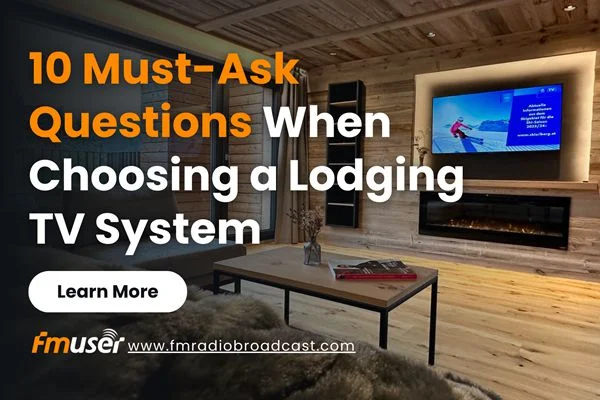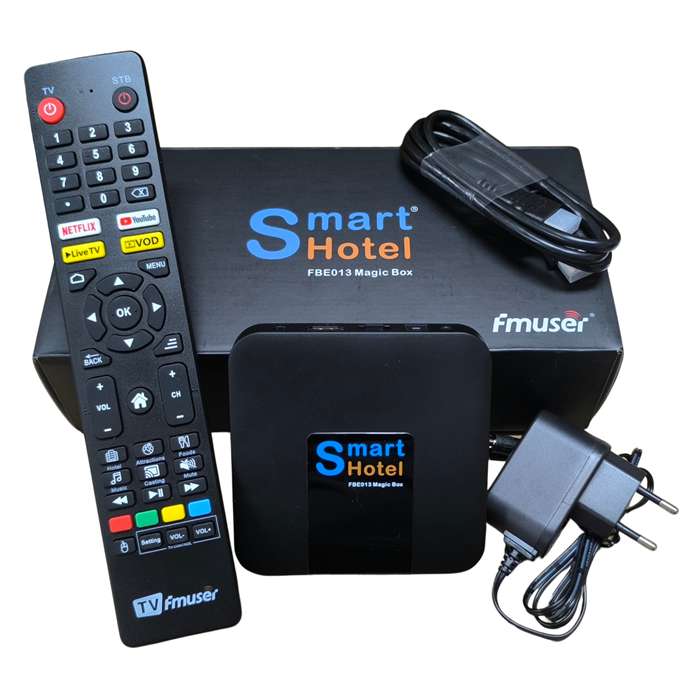
Hot tag
Popular search
10 Must-Ask Questions When Choosing a Lodging TV System

Why Your Lodging TV System Decision Impacts Guest Satisfaction and ROI
The hospitality landscape is evolving rapidly, and guests now expect the same seamless entertainment they enjoy at home. For years, cable TV systems dominated hotel rooms—but as technology advances, properties are shifting to modern lodging TV systems like IPTV. The challenge? Outdated cable setups struggle to keep up with today’s demands: choppy streaming, limited interactivity, and costly hardware replacements. Meanwhile, newer IPTV solutions—like LAN-based systems or cloud platforms—promise smoother streaming, personalized content, and lower long-term costs. But how do you choose the right system without overspending or risking outdated tech?
👇👇 New Arrival! 👇👇
FMUSER FBE013 Magic IPTV STB Kit with RC
|
FMUSER FBE013 IPTV Smart Hotel Magic Box Kit with RC! Click here for details.
|
 |
For hoteliers and procurement teams, this decision isn’t just about technology—it’s about balancing guest satisfaction and ROI. Outdated cable TV might feel familiar, but hidden fees, scalability bottlenecks, and compatibility gaps (e.g., integrating with PMS or smart room devices) can drain budgets. On the other hand, IPTV systems like FMUSER’s LAN-based solutions offer reliability and precise cost control, but only if you ask the right questions when evaluating providers.
The stakes are high:
- Costs: Cable systems often include hidden fees for maintenance and upgrades, while poorly planned IPTV rollouts risk budget blowouts.
- Scalability: Adding rooms or upgrading content is cumbersome with cable TV but streamlined with modular IPTV.
- Integration: Clunky compatibility between your TV system, PMS, or Wi-Fi frustrates staff and guests alike.
The good news? You don’t have to choose between “sticking with cable” or “going all-in on the cloud.” Solutions like LAN-based lodging TV systems bridge this gap, offering the security of on-premise control and modern features like video-on-demand or mobile casting. But with so many providers claiming to have the “perfect” solution, how do you separate hype from reality?
Let’s start with the critical questions to ask—so you can future-proof your property without compromising your budget.
Contact Now, We're Here to Help!
Question 1: "What’s the Total Cost of Ownership (Including Hidden Fees)?"
When evaluating lodging TV systems, the upfront price tag is just the tip of the iceberg. Cable TV systems might seem affordable initially, with lower installation costs for existing setups. However, they often come with hidden long-term expenses like:
- Maintenance fees for aging hardware (e.g., replacing coaxial cables or signal amplifiers).
- Limited upgradability, forcing costly overhauls to add features like streaming or video-on-demand.
- Channel licensing costs that rise annually, with little flexibility to customize packages.
LAN-based IPTV solutions, on the other hand, often have higher upfront costs (e.g., network upgrades or set-top boxes) but deliver longer-term savings:
- No recurring signal fees: Content is delivered over your existing network.
- Scalable infrastructure: Add rooms or features without rewiring or major hardware changes.
- Transparent pricing: Bundled software updates and remote maintenance reduce surprise costs.
Why It Matters:
A boutique hotel in Miami learned this the hard way. After sticking with cable TV for 5 years, they spent $12,000/year on repairs and channel packages—far exceeding their initial budget. Switching to a LAN-based IPTV system slashed annual costs by 60%, freeing up funds for guest-facing upgrades.
Pro Tip:
“Always ask providers for a 5-year cost breakdown. FMUSER’s LAN-based systems, for example, offer fixed upfront pricing with no hidden fees—so your budget stays predictable.”
Contact Now, We're Here to Help!
Question 2: "Can the System Grow with Our Lodging Facility?"
Scalability isn’t just a buzzword—it’s a critical factor for hotels, resorts, or apartment complexes planning expansions or tech upgrades. Traditional cable TV systems rely on physical coaxial infrastructure, which creates rigid limitations:
- Adding Rooms: Each new room requires complex wiring, labor costs, and signal boosters, which can cost $150–$300 per room for cable retrofits.
- Integrating New Tech: Want to offer streaming apps or digital concierge services? Cable TV can’t easily support modern features without third-party add-ons.
- Future Upgrades: Scaling to a larger property? Older cable networks often struggle with signal degradation, leading to pixelated screens and guest complaints.
LAN-based IPTV systems, by contrast, are built for growth:
- Modular Design: Add rooms by simply connecting new devices (e.g., set-top boxes or smart TVs) to your existing network. No rewiring needed.
- Bandwidth Flexibility: Modern LAN networks handle hundreds of rooms simultaneously. Need to expand? Upgrade your network switches—not the entire TV system.
- Tech-Ready: Integrate new features like video-on-demand, mobile casting, or PMS integrations through software updates, not hardware replacements.
Why It Matters:
A ski resort in Colorado learned this firsthand. After adding 50 rooms, their cable TV system required $25,000 in upgrades to avoid signal loss. Switching to a LAN-based IPTV solution let them expand another 100 rooms later with minimal costs—saving 40% compared to cable.
Pro Tip:
“Ask providers about modular scalability. For example, FMUSER’s LAN-based systems let properties start small and expand room-by-room, with no disruptive overhauls. Their solutions even adapt to smart room upgrades like voice controls or IoT integrations.”
Contact Now, We're Here to Help!
Question 3: "Does It Work with Our Existing Cable TV Infrastructure?"
Upgrading your lodging facility’s TV system doesn’t have to mean ripping out all your current infrastructure. Hybrid IPTV systems let you bridge old and new technology, preserving your existing cable TV investments while unlocking modern features. Here’s how it works:
- Reuse Existing Cabling: Hybrid systems combine coaxial cable networks (already in your walls) with IPTV over LAN, minimizing rewiring costs.
- Phased Upgrades: Transition room-by-room or floor-by-floor—ideal for properties that can’t afford downtime.
- Cost Efficiency: Retain functional hardware (e.g., cable boxes) while adding IPTV features like video-on-demand or mobile integration.
A historic hotel in New Orleans faced this dilemma. They wanted modern streaming services but couldn’t overhaul their vintage building’s cable wiring. By adopting a hybrid IPTV system, they reused 70% of their coaxial infrastructure and saved $18,000 in retrofitting costs. Guests now enjoy IPTV features in renovated sections, while older wings still use reliable cable TV—all managed through one platform.
Cable TV Limitations in Hybrid Setups:
- Limited to basic channels unless paired with IPTV streaming.
- Requires gateway devices to convert IPTV signals for coaxial networks.
LAN-Based IPTV Advantages:
- Centralized control of both cable and IPTV content through a single interface.
- Gradual migration path: Prioritize IPTV in high-value areas (suites, lobbies) first.
Pro Tip:
“Ask providers about hybrid compatibility. FMUSER’s solutions, for example, seamlessly integrate with legacy cable TV systems. Their gateways allow properties to adopt IPTV without abandoning working infrastructure—perfect for phased upgrades or budget-friendly transitions.”
Contact Now, We're Here to Help!
Question 4: "How Easy Is Integration with PMS and Guest Wi-Fi?"
A lodging facility’s TV system shouldn’t operate in isolation—it needs to seamlessly connect with your Property Management System (PMS) and guest Wi-Fi to deliver a smooth, modern experience. Traditional cable TV systems often fall short here, requiring manual updates for room availability or billing. But with LAN-based IPTV, integration becomes a streamlined process:
- PMS Sync: Automate room status updates (e.g., check-in/out) to enable features like personalized welcome screens or billing for premium content.
- Wi-Fi Compatibility: Ensure IPTV streams don’t congest guest Wi-Fi by using a dedicated VLAN (Virtual Local Area Network) for TV traffic.
- Single Dashboard Control: Manage room services, promotions, and content from one interface tied to your PMS.
Why It Matters:
A coastal resort in California struggled with their cable TV system’s lack of PMS integration. Staff manually updated room statuses, leading to billing errors and delayed content access for guests. After switching to a LAN-based IPTV system, they automated 90% of these tasks, cutting front-desk workload by 15 hours/week and boosting guest satisfaction scores by 20%.
Cable TV Limitations:
- No direct PMS connectivity: Requires third-party middleware for basic functions.
- Guest Wi-Fi clashes: Streaming on cable often competes with bandwidth, slowing internet speeds.
LAN-Based IPTV Advantages:
- One-Click PMS Integration: Systems like FMUSER’s sync with major PMS platforms (e.g., Opera, innRoad) to auto-update room statuses and permissions.
- Bandwidth Management: Prioritize TV traffic on a separate VLAN, preventing interference with guest Wi-Fi.
- Guest personalization: Offer tailored promotions (e.g., spa deals during checkout) via PMS-linked IPTV menus.
Pro Tip:
“Ask providers for a live integration demo. For instance, FMUSER’s LAN-based systems include a one-click PMS sync feature—no coding needed. Their team even offers free setup support to ensure hassle-free compatibility with your existing tools.”
Contact Now, We're Here to Help!
Question 5: "Is the System Future-Proof (Cloud vs. LAN-Based)?"
Choosing between cloud-based and LAN-based lodging TV systems isn’t just about today’s needs—it’s about future-proofing your investment. Here’s how the two stack up:
Cloud-Based IPTV
- Flexibility: Easy to deploy remotely, ideal for small properties with limited IT staff.
- Internet Dependency: Relies on stable, high-speed internet. Outages or bandwidth limits can disrupt service.
- Recurring Fees: Monthly subscriptions add up over time ($50–$200/month for a 100-room hotel).
- Security Risks: Content stored off-site increases vulnerability to cyberattacks or data breaches.
LAN-Based IPTV
- On-Premise Control: Host content and manage systems locally, ensuring minimal latency and uptime.
- One-Time Investment: No monthly fees after setup. Updates and maintenance are often included.
- Enhanced Security: Data stays within your property’s network, reducing breach risks.
- Offline Functionality: Operates independently of external internet, crucial for remote resorts or areas with spotty connectivity.
Why It Matters:
A mountain lodge in Utah learned this lesson after a cloud-based TV system failed during peak season due to an internet outage. Guests couldn’t stream content or access on-demand movies. Switching to a LAN-based IPTV system eliminated downtime risks and saved them $8,000/year in subscription fees.
Pro Tip:
“Ask providers about upgrade paths. FMUSER’s LAN-based solutions, for example, include free software updates for life, ensuring compatibility with emerging tech like 4K streaming or voice commands—all without relying on cloud subscriptions.”
Contact Now, We're Here to Help!
Question 6: "What Level of Vendor Support Comes with the System?"
Reliable vendor support is critical for minimizing downtime and ensuring your lodging TV system runs smoothly. Cable TV providers often offer limited assistance—think delayed troubleshooting or extra charges for onsite visits. In contrast, LAN-based IPTV solutions like FMUSER’s prioritize partnership-driven support:
- 24/7 Remote Assistance: Resolve issues like frozen screens or login errors in real time, even during peak check-ins.
- Dedicated Account Managers: A single point of contact streamlines communication (no more bouncing between departments).
- Proactive Maintenance: Regular system health checks and software updates prevent problems before guests notice them.
Why It Matters:
A family-owned resort in Arizona struggled with cable TV outages every monsoon season. Their provider took days to respond, leading to guest complaints and refunds. After switching to FMUSER’s LAN-based IPTV with 24/7 support, downtime dropped by 80%, and urgent fixes were handled in under 2 hours.
Pro Tip:
“Ask providers for their average response time and escalation process. FMUSER guarantees a 4-hour response SLA and includes lifetime software updates—no hidden fees for critical fixes.”
Contact Now, We're Here to Help!
Question 7: "Which Guest Experience Features Are Included?"
Today’s travelers demand more than just basic TV channels—they want personalized, interactive experiences. While cable TV systems limit you to static channel lineups, LAN-based IPTV solutions transform in-room entertainment into a guest engagement powerhouse:
- Mobile Casting: Let guests stream Netflix, YouTube, or personal content directly to the TV.
- Multi-Language Support: Offer interface and subtitle options for international travelers.
- In-Room Services: Integrate with your PMS to enable room service orders, spa bookings, or checkout via the TV.
- Personalized Promotions: Display targeted upsells (e.g., dining deals) based on guest preferences or stay duration.
Why It Matters:
A luxury hotel in Dubai boosted ancillary revenue by 18% after introducing FMUSER’s IPTV system. Guests used the TV to book sunset cruises and chef’s table experiences, with the PMS syncing bookings instantly. Positive reviews specifically praised the “intuitive” entertainment options.
Pro Tip:
“Ask providers about brand customization. FMUSER’s systems allow hotels to design the TV interface with their logo, colors, and curated local content—turning screens into branded guest ambassadors.”
Question 8: "How Does the System Handle Security Compliance?"
Security isn’t optional in the hospitality industry—guest data breaches can lead to hefty fines and lost trust. Cable TV systems often lack modern safeguards, while LAN-based IPTV solutions like FMUSER’s prioritize compliance:
- End-to-End Encryption: Protect guest data (e.g., payment info, viewing habits) with military-grade AES-256 encryption.
- GDPR/CCPA Ready: Automatically anonymize or purge guest data post-checkout to avoid privacy violations.
- Network Segmentation: Keep TV traffic isolated from guest Wi-Fi and PMS servers to block cyberattacks.
Why It Matters:
A European hotel group faced a €30,000 GDPR fine after their cable TV provider leaked unencrypted guest binge-watching logs. After switching to FMUSER’s IPTV, which anonymizes data and runs on a separate VLAN, they passed compliance audits effortlessly—and even earned a “data-safe” certification guests now advertise in reviews.
Pro Tip:
“Verify security certifications upfront. FMUSER’s systems are ISO 27001-certified and include audit logs for traceability—critical for proving compliance during inspections.”
Contact Now, We're Here to Help!
Question 9: "What Uptime Guarantees Are Provided?"
Uptime is the backbone of guest satisfaction—no one wants their movie night interrupted by a TV outage. Cable TV systems often operate with no uptime guarantees, leaving properties vulnerable to signal disruptions caused by weather, infrastructure老化, or provider-side errors. LAN-based IPTV solutions, however, prioritize reliability through:
- 99.9% Uptime SLAs: Contracts that compensate you for prolonged outages (e.g., refunds or service credits).
- On-Premise Hosting: Systems hosted in-house avoid cloud/internet dependencies, ensuring service continues even during ISP outages.
- Redundant Backup Systems: Automatic failover to backup servers if hardware malfunctions.
Why It Matters:
A coastal resort in Thailand faced nightly cable TV outages during monsoon season, leading to a 30% spike in complaint-driven refunds. After adopting FMUSER’s LAN-based IPTV—with 99.9% uptime guarantees—they achieved uninterrupted service for 12 months straight, earning praise for “flawless in-room tech” on travel forums.
Pro Tip:
“Always review Service Level Agreements (SLAs) for uptime clauses. FMUSER, for example, guarantees 99.9% uptime and offers penalty credits for missed targets—so your revenue stays protected.”
Contact Now, We're Here to Help!
Question 10: "Can We Test the System Before Committing?"
Testing a lodging TV system before signing a contract is crucial to avoid costly mistakes. Cable TV providers rarely offer trial periods, forcing properties to gamble on performance. In contrast, LAN-based IPTV vendors like FMUSER prioritize transparency through:
- Free Pilot Programs: Test the system in 5–10 rooms for 14–30 days at no cost.
- Custom Network Replication: Demo the IPTV on a network setup mirroring your property’s infrastructure.
- Post-Trial Analytics: Detailed reports on guest engagement, bandwidth usage, and ROI potential.
Why It Matters:
A golf resort in Scotland tested FMUSER’s IPTV in 15 suites first. They discovered Wi-Fi interference in rooms with thick stone walls—FMUSER’s team adjusted router placements pre-installation, ensuring flawless streaming post-rollout.
Pro Tip:
“Ask providers about post-trial guidance. FMUSER offers free configuration optimization and ROI analysis based on trial data—so you make an informed decision, not a leap of faith.”
Contact Now, We're Here to Help!
Choose Smarter: Your Next Steps for a Modern Lodging TV System
The right TV system can elevate guest experiences, streamline operations, and boost your property’s bottom line—but only if you ask the right questions upfront. Whether you’re upgrading from cable TV, building a new system, or exploring hybrid models, the challenges remain the same: cost control, scalability, and future-proofing.
Recap the Essentials:
- Cable TV systems, while familiar, often hide long-term costs and limit growth.
- LAN-based IPTV solves these challenges with on-premise control, no recurring fees, and effortless scaling.
- Hybrid models let you protect prior investments while adopting modern features like mobile casting or PMS integrations.
FMUSER’s LAN-based solutions are designed with hospitality in mind. From modular scalability to 24/7 vendor support, they address the pain points hoteliers and procurement teams face daily—proven by properties worldwide that have slashed costs and boosted guest satisfaction.
Contact Now, We're Here to Help!
Tags
Contents
Related Articles
CONTACT US


FMUSER INTERNATIONAL GROUP LIMITED.
We are always providing our customers with reliable products and considerate services.
If you would like to keep touch with us directly, please go to contact us




